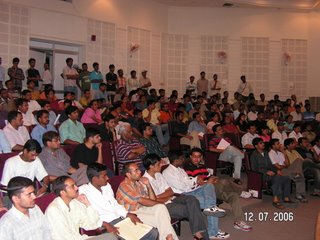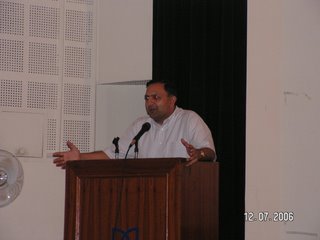...my continuation on the commission will serve no useful purpose.
 Dr Pratap Bhanu Mehta speaks in JNU (Top)
Dr Pratap Bhanu Mehta speaks in JNU (Top)The large audience hangs on to every word (Below)
(for more photographs visit http://y4ejnu.multiply.com/photos/album/37)
Dr Pratap Bhanu Mehta, while speaking on Knowledge and Society in the 21st century to an overwhelming audience in JNU exposed the shortcomings of Higher Education in India and also expressed concern about how gimmicks like the Reservation issue will only create blocks within the student community.
Here's a summary of points Dr Mehta picked up, during his talk-
1) The status of Education in India is in such shambles that it needs an urgent argument and a Public Debate to be able to move ahead in any positive direction.
2) When we talk about methods of improving our education system while ensuring social justice we should also ask if there are methods better than the one we are using, that can facilitate these objectives more effectively. If we pre-emptively abort the pursuance of such alternatives because of mutual mistrust, it will be tantamount to admitting defeat before we embark.
3) It is unfortunate that the Indian polity thinks and propagates such misleading ideas as "India is a world leader in higher education." This is NOT the same thing as "India supplies the world with highly qualified professionals." Indians doing well abroad CANNOT be counted as the symbols of India's success in Higher Education! To make a comparison- for every 1 Indian in India who holds a patent, 28,000 Indians do that abroad. Our situation is so precarious that if Indians who go abroad to explore educational opportunities stay back here- it will only result in higher demographic pressure on our education system- depriving larger numbers of their aspirations of education.
4) To compare with H.E. in China, of whom India was marginally ahead in the 70's, now India is behind by many orders of magnitude. Around 5000 Indian students are enrolled in China for courses in Medicine. Also, while China has taken out massive recruitment drives to pull teachers/professors to China (both Chinese and foreigners) to teach, India has not made any such efforts.
5) India has some 300 odd universities, of which only 20% impart professional education like medicine and engineering. Yet, most of the money of Higher Education is siphoned off into these areas. This is in stark contrast to what is seen in most other educationally sound countries- and is counter-productive.
6) While most serious countries spend about 16% of their budget on education without raising public tax, India needs to levy an Education Cess to increase its expenditure in Higher Education. Anybody saying that there aren't enough resources to put into Higher Education is SIMPLY lying!! The budget of JNU is nothing compared to that of Ashoka Hotel!!!!!!!!!
7) India is probably the only country in the world where even setting up an undergraduate university needs an Act of the Parliament! This and other bureaucratic tapes in the education system in India keep everything under such suffocating control that growth is almost impossible. A system where the teachers cannot design their own courses, where the students cannot choose their own courses, where these courses/teaching will be tightly controlled by the authorities above- little growth is possible.
8) India must have different kind of institutions for students of different needs- it is neither essential nor required for everyone to do a PhD!! If there are students who want quick employment, courses should be available for such needs. A good example can be University of California (Berkley) and the California State University (Long Beach) - while the former has formidable standards of entry, the latter is obliged to admit any student who wants to enter. This kind of dual system ensures that each student gets what they want.
9) China has seen a tremendous growth in the number of private universities in the recent past, and this has been due to the acute demographic pressure in that country. If the State cannot or is not willing to spend money to bring up enough opportunities for education, our demographic pressures demand that we catch any help that may be possible. Thus, private institutes of learning are a dire necessity!!
10) Unfortunately, the debate of education is so ludicrously focussed on the inputs- never on the outputs. We all are focussed on who gets in, not on whether who gets out is worth it. In a recent survey in Delhi- it was seen that 50% of the medical practitioners perform only as good as quacks!! This clearly tells us that our institutes of learning are not doing enough to teach students. Our top institutes like the IITs/IIMs are not institutes of learning, but institutes of screening for entry. This will have to change. Quality standards should also be imposed on the outputs- not on the inputs alone.
11) Best society is that which allows everyone to meet their aspirations and that is where the need to provide opportunity arrives. Yet, to uphold standards is also very important- we have to respect the intrinsic autonomy of the sphere of every field. If athletic skills are the ones that matter in athletics- they should be the major yardstick to choose athletes. Replacing this yardstick by other criteria (like regional/ caste bias) is dangerous.
12) In terms of Social Justice, the miserably low percentage (less than 10%) of people within the SC/STs having benefited from our current schemes is a stark teller of how poorly such schemes have fared. Yet, the polity's ignorance and lack of vision is so high that they see social justice and reservation as synonymous!
13) Much is being made of the South Indian success. With >80% of the private institutions of the country thriving in South India, it is not hard to guess the hollowness of the argument. Also, when such a large section (75%) of the South Indian population is covered under some form quota- the objective of quota stands defeated!! Before we say that South India has been a success, we must ask- what was the objective of the South Indian experiment with massive quotas. If it was marginalising the forward castes, it definitely has been a success- the FCs of the south have done a mass exodus from the states. But, if the objective was social justice- the success story needs to be taken with a pinch of salt.
14) We should refrain from accepting the blocks the Indian polity assigns us to- SC, ST, OBC, OC and the like. These identities should be given up by us!!
15) Youth for Equality has done a great job in making the government sit up and take notice. It is for the students to assert what they want and not for the polity to dole out what it likes. Now, YFE has to strive to do a wider job- to bring about a paradigm shift in the way our system works; to build trust, hope and confidence and become the Pressure Point that demands for a change!!
Dr Pratap Bhanu Mehta, while speaking on Knowledge and Society in the 21st century to an overwhelming audience in JNU exposed the shortcomings of Higher Education in India and also expressed concern about how gimmicks like the Reservation issue will only create blocks within the student community.
Here's a summary of points Dr Mehta picked up, during his talk-
1) The status of Education in India is in such shambles that it needs an urgent argument and a Public Debate to be able to move ahead in any positive direction.
2) When we talk about methods of improving our education system while ensuring social justice we should also ask if there are methods better than the one we are using, that can facilitate these objectives more effectively. If we pre-emptively abort the pursuance of such alternatives because of mutual mistrust, it will be tantamount to admitting defeat before we embark.
3) It is unfortunate that the Indian polity thinks and propagates such misleading ideas as "India is a world leader in higher education." This is NOT the same thing as "India supplies the world with highly qualified professionals." Indians doing well abroad CANNOT be counted as the symbols of India's success in Higher Education! To make a comparison- for every 1 Indian in India who holds a patent, 28,000 Indians do that abroad. Our situation is so precarious that if Indians who go abroad to explore educational opportunities stay back here- it will only result in higher demographic pressure on our education system- depriving larger numbers of their aspirations of education.
4) To compare with H.E. in China, of whom India was marginally ahead in the 70's, now India is behind by many orders of magnitude. Around 5000 Indian students are enrolled in China for courses in Medicine. Also, while China has taken out massive recruitment drives to pull teachers/professors to China (both Chinese and foreigners) to teach, India has not made any such efforts.
5) India has some 300 odd universities, of which only 20% impart professional education like medicine and engineering. Yet, most of the money of Higher Education is siphoned off into these areas. This is in stark contrast to what is seen in most other educationally sound countries- and is counter-productive.
6) While most serious countries spend about 16% of their budget on education without raising public tax, India needs to levy an Education Cess to increase its expenditure in Higher Education. Anybody saying that there aren't enough resources to put into Higher Education is SIMPLY lying!! The budget of JNU is nothing compared to that of Ashoka Hotel!!!!!!!!!
7) India is probably the only country in the world where even setting up an undergraduate university needs an Act of the Parliament! This and other bureaucratic tapes in the education system in India keep everything under such suffocating control that growth is almost impossible. A system where the teachers cannot design their own courses, where the students cannot choose their own courses, where these courses/teaching will be tightly controlled by the authorities above- little growth is possible.
8) India must have different kind of institutions for students of different needs- it is neither essential nor required for everyone to do a PhD!! If there are students who want quick employment, courses should be available for such needs. A good example can be University of California (Berkley) and the California State University (Long Beach) - while the former has formidable standards of entry, the latter is obliged to admit any student who wants to enter. This kind of dual system ensures that each student gets what they want.
9) China has seen a tremendous growth in the number of private universities in the recent past, and this has been due to the acute demographic pressure in that country. If the State cannot or is not willing to spend money to bring up enough opportunities for education, our demographic pressures demand that we catch any help that may be possible. Thus, private institutes of learning are a dire necessity!!
10) Unfortunately, the debate of education is so ludicrously focussed on the inputs- never on the outputs. We all are focussed on who gets in, not on whether who gets out is worth it. In a recent survey in Delhi- it was seen that 50% of the medical practitioners perform only as good as quacks!! This clearly tells us that our institutes of learning are not doing enough to teach students. Our top institutes like the IITs/IIMs are not institutes of learning, but institutes of screening for entry. This will have to change. Quality standards should also be imposed on the outputs- not on the inputs alone.
11) Best society is that which allows everyone to meet their aspirations and that is where the need to provide opportunity arrives. Yet, to uphold standards is also very important- we have to respect the intrinsic autonomy of the sphere of every field. If athletic skills are the ones that matter in athletics- they should be the major yardstick to choose athletes. Replacing this yardstick by other criteria (like regional/ caste bias) is dangerous.
12) In terms of Social Justice, the miserably low percentage (less than 10%) of people within the SC/STs having benefited from our current schemes is a stark teller of how poorly such schemes have fared. Yet, the polity's ignorance and lack of vision is so high that they see social justice and reservation as synonymous!
13) Much is being made of the South Indian success. With >80% of the private institutions of the country thriving in South India, it is not hard to guess the hollowness of the argument. Also, when such a large section (75%) of the South Indian population is covered under some form quota- the objective of quota stands defeated!! Before we say that South India has been a success, we must ask- what was the objective of the South Indian experiment with massive quotas. If it was marginalising the forward castes, it definitely has been a success- the FCs of the south have done a mass exodus from the states. But, if the objective was social justice- the success story needs to be taken with a pinch of salt.
14) We should refrain from accepting the blocks the Indian polity assigns us to- SC, ST, OBC, OC and the like. These identities should be given up by us!!
15) Youth for Equality has done a great job in making the government sit up and take notice. It is for the students to assert what they want and not for the polity to dole out what it likes. Now, YFE has to strive to do a wider job- to bring about a paradigm shift in the way our system works; to build trust, hope and confidence and become the Pressure Point that demands for a change!!



2 Comments:
overseas education consultants in hyderabad
do you want to study in abroad today or in the next intake. we are the best and top rated study abroad consultancies in india with good visa assurance.we help you in filing the f1 visa for you in very less time. we are also help you with information needed to apply for the college university.
By taiseer, at Tue Dec 13, 10:32:00 PM GMT+5:30
taiseer, at Tue Dec 13, 10:32:00 PM GMT+5:30
for the following usage would you like to master for in other countries. most effective visa rate of success also
self-confidence is without question
involving our best very good. during highly less time when I facilitate
you to
record an individual's fone visa. as part of unites states if you want all the the specifics of educational institutions as well as , univerisity then we beneficial reputed overseas consultancy in hyderabad.
By new gen, at Fri Feb 03, 01:21:00 AM GMT+5:30
new gen, at Fri Feb 03, 01:21:00 AM GMT+5:30
Post a Comment
<< Home